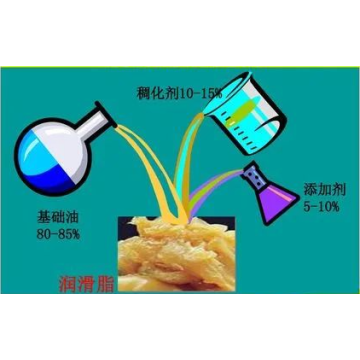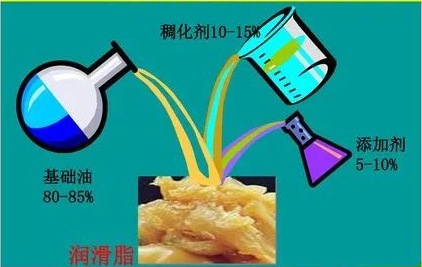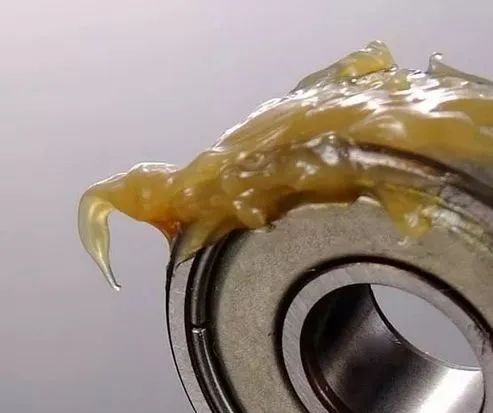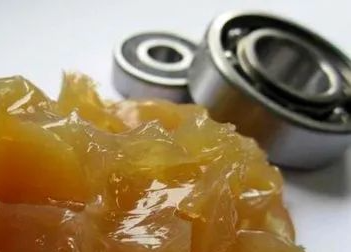
Mastering this knowledge can handle the selection and use of various mechanical greases
First, the main performance indicators of grease
1. Drop point: refers to the temperature when heating under specified conditions and reaching a certain fluidity. It can generally determine the use temperature of the lubrication finger (the drop point is 15 to 30 degrees higher than the use temperature drop). 2. Cone penetration: refers to the depth of free vertical penetration of the test cone into the grease within 5s (unit: 1/10mm) under the specified temperature and load. It is a measure of the consistency and hardness of lubrication. 3. Colloidal stability (oil extraction) : refers to the ability of lubrication under the action of external force to preserve oil in the skeleton of its thickener, which is determined by the amount of oil. When the amount of grease is more than 5%-20%, the grease can not be used. 4.Oxidation stability: refers to the ability to resist oxidation in storage and use. 5.Mechanical stability: refers to the ability to resist changes in consistency under mechanical working conditions. Poor mechanical stability, easy to cause the consistency of grease decline. 6.Evaporation loss: refers to the percentage of the total amount of loss under specified conditions. It is an important factor affecting the service life of grease. 7. Water resistance: refers to the ability to not dissolve in water, not absorb water from the surrounding medium and not be washed away. 8.Similar viscosity: the ratio of shear stress to shear speed of non-Newtonian fluid flow. When the speed is high, the viscosity is low, and vice versa, the viscosity is larger. Second, Failure analysis of grease ① Failure caused by physical factors In use, grease will be subjected to mechanical shear and centrifugal force at the same time, the grease will be thrown out of the friction interface and make it oil, resulting in the reduction of grease oil content, cone penetration reduction and hardening, to a certain extent, the grease will completely fail; Under the action of mechanical shear, the structure of the grease is damaged (such as the soap fiber detaching or orientation), which causes its softening, consistency reduction and oil extraction increase, and finally leads to failure. Under normal circumstances, if the transfer speed of grease is increased by 2000r/min, its life will be reduced by about half. Under high shear stress, the speed is doubled, and the service life is only equivalent to 1/10 of the original life. ② Failure caused by chemical factors Grease chemically reacts with oxygen in the air to produce acidic substances, which first consumes antioxidant additives in the grease, but after a certain extent, the generated organic acids will corrode metal components and destroy the structure of the grease, making its drop point decrease, the viscosity of the Base Oil increases and the fluidity becomes poor. A large number of tests show that the higher the temperature, the more obvious the decline of grease life. For example, when the temperature is 90 to 100 degrees, the life of the fat is reduced by about half for every 19 degrees increase in temperature, and at 10 to 150 degrees, the life of the fat will also be reduced by half for every 15 degrees increase in temperature. In addition, the moisture, dust and harmful gases in the grease use environment are also important factors that make it deteriorate. For example, the grease mixed with copper, iron, lead and bronze wear particles will catalyze the oxidation of grease. In short, there are many reasons for the failure of grease, and sometimes it may be caused by a certain reason, but it is more the result of the same action of a variety of factors, or to break through a reason, and then other reasons work together. Third, the reasonable choice of grease When choosing grease, the working condition (load, speed, temperature), working state (continuous operation, intermittent operation, vibration and shock, etc.) and working environment (humidity, temperature, air pollution degree, etc.) should be mainly considered. ① The use temperature of grease should be at least 20 to 30 degrees lower than its drop point When the temperature is high, the fat with good oxidation resistance, small evaporation loss and high drop point should be selected; In the use of low temperature, should choose low starting moment, similar viscosity of small fat, such as the base oil of oil. ② The selected grease should be adapted to the speed of use of the lubricated friction pair At high speed, grease made of low viscosity base oil with large coning degree should be selected; For low speed grease, grease with high coning grade made of high viscosity base oil should be selected. ③ The selected grease should be suitable for the load size. Heavy load, should choose the base oil viscosity high, thickener content of high grease. When the load is particularly large, attention should be paid to the selection of grease with extreme pressure additives or fillers (molybdenum disulfide, graphite); For medium and low load, grease with short soap fiber structure and medium viscosity base oil of No. 2 consistency is generally selected. The selected grease should be adapted to the environmental conditions used In the humid air or in contact with water environment, such as calcium base, lithium base, composite lithium base and other good water resistance grease should be used; When the dust is long, you should choose a thicker and harder (that is, a higher grade) fat, so that the sealing is better and impurities can be prevented from mixing into the friction pair. In the environment of enhanced chemical media, synthetic oil greases that are resistant to chemical media such as fluorocarbon greases should be selected. ⑤ The selected grease should be adapted to the grease supply mode of the friction pair For centralized grease supply, 00~1 grease should be selected; For the parts that are regularly filled with grease such as grease gun and grease cup, No. 1 to No. 3 grease should be selected; For the parts that are used for a long time without fat change, No. 2 or No. 3 grease should be selected. The selected grease should be adapted to the working state of the friction pair For example, when the vibration is large, the application of high viscosity, adhesion and vibration absorption good grease, such as high viscosity naphthenic or mixed base lubricating oil thickened compound soap grease. The selected grease should be suitable for its purpose of use The grease used for lubrication must be selected according to the different types of friction pairs, working conditions, working states, environmental conditions and grease supply methods. For the protection of grease, should be able to effectively protect the metal from corrosion, such as protection with seawater contact parts, should choose strong adhesion, water resistance of aluminum grease; Grease for general protection can be made by thickening high viscosity base oil with solid hydrocarbons. For sealing grease, attention should be paid to its resistance to the solvent of the sealed medium. The selected grease should be as far as possible to ensure that the variety of fat is reduced and economic benefits are improved. In the case of meeting the requirements, try to choose lithium grease, compound soap grease, polyurea grease and other multi-effect general grease. In this way, the variety of fat is reduced, the management of fat is simplified, and the cost of fat can be reduced and the maintenance cost can be reduced because of the long service life of the polypotency fat. Fourth, the correct use of grease ① The lubrication amount of filling should be appropriate If the amount of fat is too large, the friction torque will increase, the temperature will increase, and the fat consumption will increase. However, if the amount of grease is too small, it can not obtain reliable lubrication and dry friction occurs. Generally speaking, the appropriate amount of grease is 1/3 to 1/2 of the total void volume in the bearing. However, depending on the situation, sometimes the bearing edge should be coated with grease to perform cavity lubrication. ② Pay attention to prevent the mixing of different types, grades and old and new greases Avoid the cross use of grease containers and tools, otherwise, it will have adverse effects on the grease drop point, cone penetration and mechanical stability decline. ③ Pay attention to the replacement of new fat work Because the variety and quality of grease are constantly improved and changed, when the old equipment is changed to the new grease, it should be tested before it can be formally used; When replacing the new grease, remove the waste grease first and clean the parts. When adding grease, the waste grease should be extruded until the new grease is seen at the grease drain port. ④ Pay attention to the management of the grease filling process Before receiving and adding grease, strict attention should be paid to the cleaning of containers and tools, and the grease supply port on the equipment should be wiped clean in advance to prevent the mixing of mechanical impurities, dust and sand. ⑤ Pay attention to the timely replacement of seasonal grease If the temperature difference between winter and summer in the environment of the equipment is large, if the winter fat is used in summer or vice versa, the result will be counterproductive. ⑥ Pay attention to regular grease The time of adding grease should be determined according to the specific use, which should ensure reliable lubrication and not cause waste of grease. Do not use wooden or paper containers to pack grease Prevent oil loss from hardening, mixing with water or being polluted, and should be stored in a cool and dry place.

![]() February 24, 2024
February 24, 2024







